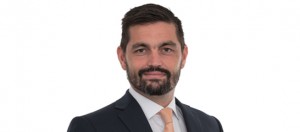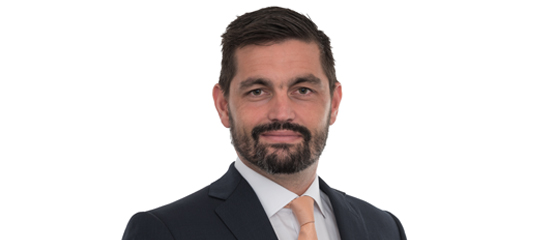Change at the Top
Greg Kane was recently promoted to head the Middle East division of leading consultant WSP | Parsons Brinckerhoff, replacing Tom Bower as managing director. As he approaches a decade in Dubai, the 39-year-old Dubliner spoke to Jason OConnell about completing the integration of the newly merged company, while managing the challenges and opportunities presented by a regional construction market in a state of flux.
Congratulations on the recent promotion. Was it unexpected?
Not entirely. I was recruited three years ago to join the old WSP as operations director. There was always a succession plan of sorts but succession planning doesnt always go as planned! Tom leaving the business was to some people a bit of a surprise, to some of us not such a big surprise. Following Toms departure was a process whereby our global COO reviewed the people in the business that he felt were worth considering and then selected me to take the role.
Whats top of your in tray in the new role?
The first thing to do and the message Ive shared internally is to reinforce our global strategy which focuses on four elements: people, clients, expertise and operational excellence. The first two of those are very, very important. Since I was appointed Ive been going to as many of our offices as possible and having one on one time with people but also speaking with large groups and then getting out and seeing clients.
A lot of our existing clients are curious to know what the change might mean so Im spending time seeing those clients and making sure that theyre comfortable with the change. Im also taking the opportunity to reconnect with some clients that weve not seen recently. Im not looking to make massive changes but following the integration between WSP and Parsons Brinckerhoff, we came up with a new business strategy and a new business structure around 15 months ago so now is a good chance to take stock and ask if we got those things right first time. Well probably make a few tweaks. Its more about small incremental change as opposed to any radical reshaping of the business which we did about 15 months ago.
How is the integration going?
Starting January 2015 we put a huge amount of effort into trying to integrate as much as we could. And I would say, from a mechanical side of things, we are close to 100 percent integrated. We all work in the same offices off the same platforms. Weve rebranded the entire business WSP | Parsons Brinckerhoff. Things like culture and way of working take a little bit longer. I think weve made good progress but a year and a bit in its still a work in progress.
WSP was more known in the vertical infrastructure space whereas Parsons Brinckerhoff would have been more known in horizontal infrastructure transportation, roads, highways, etc. Thats why the two businesses coming together made so much sense. There wasnt a huge amount of overlap where we were bringing together duplicate resources and skills. And in the Middle East in particular, with the exception of some infrastructure design areas, we had very little overlap.
As a result of the two businesses coming together last year we had zero front office technical people leave the business. Back office business support finance, HR, IT – we did have some rationalization as you would expect. We came together as two equal sized businesses so were now a business twice the size.
Both companies saw a lot of growth in recent years even prior to the merger. What was behind that?
Pre integration WSP grew 40 percent in 2013 and again in 2014. 2015 was a challenging year for most businesses in the region. Parsons Brinckerhoff also grew in that time. The market improved from 2012 onwards and a bit of confidence came back to Dubai and the region. That growth was built off a really strong focus on our people, making sure we got the best people and retaining them and focusing on delivering quality products to our clients – the type of service that our clients want to come back and procure more of.
How do you meet the challenges of the current market?
Its a slightly more challenging market than previous years but my sense is there are still good opportunities out there. Obviously weve got Expo in Dubai which is driving a lot of property and building work which we feel were well positioned to deliver and were doing that as we speak. The oil price and the impact that thats having means governments are being cautious, as you can understand but we have seen a slight recovery in the oil price and with that brings a little more confidence. And maybe if oil prices remain closer to current levels than previous levels that will drive a different way for governments to procure their infrastructure.
The region still has a latent demand that needs to be delivered in terms of infrastructure and buildings. You have things like Expo and the World Cup and governments releasing strategic visions. That all indicates that things are moving and happening and leaves me feeling a little more positive than say 12 months ago.
Which countries and sectors are suffering the most and which are not doing too badly?
Weve seen a level of activity in Dubai in the last six months. Some of the projects around Expo have meant more work for us but theyve also meant more confidence. Qatar has been slow for us for the last 12-18 months but we are seeing things starting to move a little. And Qatar still has big ambitions to deliver a lot of infrastructure ahead of the 2022 World Cup.
Saudi Arabia is an area of our business that has not been as active as other countries but we are interested in KSA. We have a new country lead director whos been there since the start of the year. Hes been exploring prospects and we feel positive we will have a role to play in KSA even with oil at lower levels than in the past. Weve seen a new strategic vision for 2030 and we feel thats going to bring opportunities and client needs that we can serve. Its early days but its ambitious which is positive because it presents opportunities for our industry. The way of doing things in Saudi appears to be changing so we are exploring there more so than in previous years.
Saudi is the most obvious example of the change in oil prices leading to a shake-up in how some things are done. Are we going to see a switch to alternative methods of financing, for example PPPs?
Theres certainly more discussion around PPP. One theory is that this region as it matures will move to means of procurement which are the norm in more mature economies. PPP is a method of procurement that has been prevalent in places like the UK, Canada and Australia for many years. Will it gain traction in the Middle East? My sense is that it or a version of it whether its PFI or other forms of alternative finance will become more relevant in the Middle East than in previous years. Again, its related to the oil price but its also related to the region and the economies maturing. PPP implies more design-build type opportunities. With design build comes different opportunities than some of the projects weve worked on in the past. So yes, it does seem like a natural next step for the region as it continues to develop.
We seem to be seeing a shift to renewable energy projects in the region. Is it fair to say its reached a tipping point here and do you expect to be doing more work in that area in the coming years?
Im not sure if weve reached a tipping point yet but I definitely sense that were on the journey to it. Theres an inevitability to renewables to an extent. Whether we ever become reliant on renewables for base load power is debatable but were definitely on that journey. WSP | Parsons Brinckerhoff was involved in the Mohammed Bin Rashid Solar Park phase 1 and now youve got phase 2 being developed. I just see that continuing. The region has an abundance of opportunity around solar power. Its becoming more and more commercially viable so there is definitely a shift towards it and I see opportunity for us in that space. With the integration of Parsons Brinckerhoff came a big power business with a very rich heritage.
What other radical changes are we likely to see?
Some of the strategic plans that the governments in the region are coming up with are going to present a myriad of opportunities because its going to impact so many things power, infrastructure, rail a host of opportunities and enough for our industry to wrap its arms around. We have a role to play in supporting these governments deliver what they need to deliver. And we need to be sensitive and listen to what they are trying to do and find a way to play a part. Our industry has played a huge role in this region over the last 40-50 years and I see opportunities to continue doing that. Things like alternative power and procurement are perhaps just the tip of the iceberg. Im sure the region will continue to present opportunities. And we have things like Expo and the World Cup which are not small things to deliver and we have a big role to play helping to deliver those visions.
Beyond 2020 2022 what will drive the regional economies?
The one thing I do expect is for this region to maintain its level of ambition. As long as Ive been here this region has been very ambitious in what it wants to achieve. Its always set very high goals and largely has delivered them. If you look at the region today compared to 10 years ago when I arrived, its a massive transformation. That level of ambition and vision and drive, I dont expect that to change. What that will bring, whether its more events or strategic visions for 2030 or 2040, I dont know but I do expect the level of ambition to be undiminished.
What projects are you involved in at the moment?
Were involved in a large number of projects across the region, some of them incredibly important. Were involved in big power projects in Ras Laffan in Qatar and some others in Saudi Arabia. More visually we are the lead consultant for the Dubai I observation wheel on Bluewaters Island which is making good progress and were going to see the wheel starting to be erected in the next few months. The spindle was lifted into place a couple of weeks ago which broke a number of records. Some of our guys were working night and day in the run up to it to make sure that everything went well. Once that starts to take shape thats a very visual demonstration of the level of ambition that this region has and when its finished it will be an amazing project and one that we, along with others that worked on it, are hugely proud of. Were also the lead consultant for the retail component of the Bluewaters Island and the whole thing is going up very fast. Its a very clear example of how quickly things can happen in this region.





